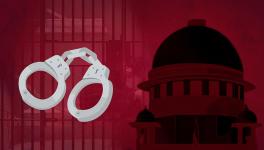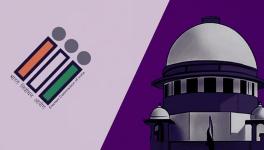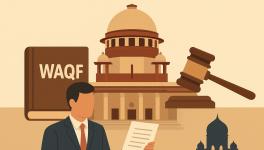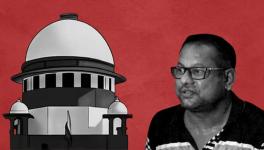SC’s Pegasus Verdict Embodies Vision of Gandhi, Ram Mohan Roy
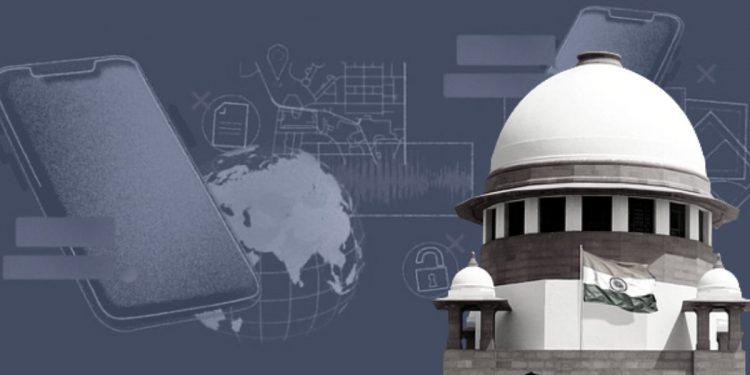
The Supreme Court’s verdict on the surveillance of phones of several prominent Indians has reinforced Mahatma Gandhi’s argument that courts are not supposed to be subservient to the government but dispense justice and Raja Ram Mohan Roy’s view that a free press has never yet caused a revolution in any part of the world, writes S.N. SAHU.
—————–
The Supreme Court’s (SC) recent ruling directing an independent investigation into the allegations of unauthorised surveillance using the Pegasus spyware represents the vision of Mahatma Gandhi regarding the role of courts vis-à-vis the government and Raja Ram Mohan Roy’s precious words on the freedom of the press.
Acknowledging that “in matters pertaining to national security, the scope of judicial review is limited”, the top court, however, said that “this does not mean that the State gets a free pass every time the spectre of national security is raised. National security cannot be the bugbear that the judiciary shies away from by virtue of its mere mentioning”.
In his article ‘The Hallucination of Law Courts’, published in the English weekly Young India on October 6, 1920, Gandhi raised the same point, that is, when courts shy away from their duty, the nation’s liberty is at stake.
Criticising the functioning of law courts during the colonial period, Gandhi wrote:
“The worst is that they support the authority of a government. They are supposed to dispense justice and are therefore called the palladile of a nation’s liberty. But when they support the authority of an unrighteous government, they are no longer palladile of liberty; they are crushing houses to crush a nation’s spirit.”
Failure of courts to discharge duty crushes nation’s spirit
There have been phases in the post-independence period when
some courts gave verdicts and made pronouncements generating an unmistakable impression that the judiciary endorsed the executive’s decisions or was seen to be in league with it. Such unacceptable developments poorly reflected on the judiciary’s independence and crushed, in the words of Gandhi, the “nation’s spirit”.
In the last seven years, the judiciary’s independence has been questioned—verdicts in Central Bureau of Investigation Judge B.H. Loya’s death, the Rafale controversy, the Bhima-Koregaon case, among others. However, the apex court was praised when its expressed dissatisfaction over the way the Uttar Pradesh police and the state government were investigating the violence in Lakhimpur Kheri, Uttar Pradesh.
Taking suo motu cognisance of the case, Chief Justice of India (CJI) N.V. Ramana had said the court was “displeased with what happened and if the UP government did not act, it would pass orders”. Famous lawyer Dushyant Dave, who has often criticised the SC and its Chief Justices, praised the top court and CJI Ramana last month for the way they handled the Lakhimpur Kheri case. “The Supreme Court has proved it’s the sentinel on the qui vive; it’s a truly watchful guardian of the citizens,” he said.
Dave also praised CJI Ramana for doing “remarkable work in the last few months” and proving that “he is true to his constitutional oath” unlike his four predecessors, who, he said, had “failed to discharge their constitutional duties”.
Also read: Pegasus interim order: a victory for Indian democracy
Pegasus case and its ‘chilling effects’
A hundred years after Gandhi underlined the point that courts in colonial India supported the authority of the government, devaluing the nation’s esteem, the country confronted a situation wherein the judiciary was found wanting to discharge its duty. The Pegasus verdict is proof of the revival of hope that the authority and dignity of the judiciary in general and the apex court, in particular, will be salvaged.
A three-Judge SC Bench headed by CJI Ramana ordered the constitution of an independent technical committee under the supervision of retired SC Judge R.V. Raveendran to unearth the truth and ascertain if Pegasus was used to hack mobile phones of journalists, politicians (of both the Opposition and the ruling party) and other citizens and use their devices for surveillance, in complete violation of their privacy and freedom of expression.
The court overruled the government’s argument that national security would be at stake if the surveillance details are placed in the public domain.
Noting the “importance of the protection of journalistic sources for press freedom in a democratic society”, the SC observed: “The court is compelled to take up the cause to determine the truth and get to the bottom of the allegations made herein” after finding that the snooping techniques of Pegasus may have a “chilling effect” on society as a whole because of the grave allegations of infringement of rights of citizens.
National security cannot be cover
The apex court’s stern observations that the State cannot get “… a free pass every time the spectre of national security is raised” and it “cannot be the bugbear that the judiciary shies away from by virtue of its mere mentioning” constituted a breath of fresh air in upholding judicial independence, which got severely compromised during the tenure of the last four CJIs.
Though the court said that it “should be circumspect in encroaching upon the domain of national security, no omnibus prohibition can be called for against judicial review”. “The mere invocation of national security by the State does not render the Court a mute spectator,” it further observed.
Right to privacy and freedom of expression
The SC’s verdict was grounded on the fundamental right to privacy and the freedom of expression to justify the establishment of the expert committee. While noting the utility of technology for improving the lives of people, the court observed that it could be used to “breach that sacred private space of the individual”.
The manner in which the apex court explained the seminal importance of the right to privacy and the right to freedom of expression is of profound significance when the powers that be are violating these rights by ruthlessly applying draconian laws, including the law of sedition, and criminalising dissent.
The SC invoked the recognition accorded to privacy in its landmark judgment in the case of Justice K.S. Puttaswamy (Retd) vs. Union of India (2018) and observed: “The right to privacy is as sacrosanct as human existence and is inalienable to human dignity and autonomy”.
The apex court quoted a part of that judgement:
“Privacy is a constitutionally protected right which emerges primarily from the guarantee of life and personal liberty in Article 21 of the Constitution. Elements of privacy also arise in varying contexts from the other facets of freedom and dignity recognised and guaranteed by the fundamental rights contained in Part III.”
Reports available in the public domain show that Pegasus was used to hack the mobile phones of several people, including media personalities. The SC underlined the critical importance of privacy for the entire citizenry by observing:
“Privacy is not the singular concern of journalists or social activists. Every citizen of India ought to be protected against violations of privacy. It is this expectation, which enables us to exercise our choices, liberties, and freedom.”
‘Surveillance Capitalism’
The connection made by the apex court between the violation of the right to privacy with the violation of the right to exercise our choices, liberties and freedom bears ominous significance in this era, whose attributes are captured in the book The Age of Surveillance Capitalism, written by American philosopher Shoshana Zuboff. She argues that capitalism anchored in surveillance technology is undermining personal autonomy and eroding democracy.
Such exposition of the right to privacy as a precondition to exercising other rights and freedom prompted the apex court to flag the right to freedom of expression, which includes the freedom of the press.
The court made a pertinent observation that surveillance and the threat of getting spied on would force individuals and citizens to impose self-censorship and impair their ability to express themselves. “Such chilling effect on the freedom of speech,” the court said, “is an assault on the vital public watchdog role of the press which may undermine the ability of the press to provide accurate and reliable information.”
Also read: Judiciary’s Suo Moto Jurisdiction: Glimmer Of Hope Amidst Government Apathy
Ram Mohan Roy and freedom of press
In fact, the “vital public watchdog role of the press” has vastly reduced since 2014. In 2020, India was ranked 142 out of 180 countries in the World Press Freedom Index. One of the reasons for the low ranking was the reluctance of the government to remain open to criticism and questioning on the economy, international affairs and defence deals.
The verdict on Pegasus and how the top court flagged the “chilling effect” of surveillance on the freedom of speech and the resultant assault on the vital “public watchdog role of the press” reminds us of the words of Roy in 1823:
“… a free press has never yet caused a revolution in any part of the world … whereas, where no freedom of the press existed and grievances consequently remained unrepresented, innumerable revolutions have taken place in all parts of the globe.”
Roy and other prominent Indians wrote the above-mentioned words in a second memorial submitted with the East India Company against the 1823 Press Ordinance, which made it mandatory for editors and publishers to secure licences for their journals.
“Men in power hostile to the Liberty of the Press, which is a disagreeable check upon their conduct, when unable to discover any real evil arising from its existence, have attempted to make the world imagine, that it might, in some possible contingency, afford the means of combination against the Government, but not to mention that extraordinary emergencies would warrant measures which in ordinary times are totally unjustifiable …,” they further wrote.
Also read: Pegasus tracking reporters portends dark future for Indian journalism
In 1941, almost 123 years after Roy’s petition in defence of press freedom, Gandhi launched his individual Satyagraha to protest the press censorship imposed by the British after India was forced to participate in the Second World War In the only satyagraha dedicated to the cause of press freedom, Gandhi described the freedom of the pen and the press as the foundation of swaraj, and urged Indians to fight for its defence.
The SC’s verdict on going to the bottom of the truth of the Pegasus issue, grounded on the fact that it violated the right to privacy and the freedom of expression, is in tune with the vision of Gandhi and Roy, enshrined in the Constitution.
(S.N. Sahu was Officer on Special Duty and Press Secretary to President of India KR Narayanan. The views expressed are personal.)
Get the latest reports & analysis with people's perspective on Protests, movements & deep analytical videos, discussions of the current affairs in your Telegram app. Subscribe to NewsClick's Telegram channel & get Real-Time updates on stories, as they get published on our website.










